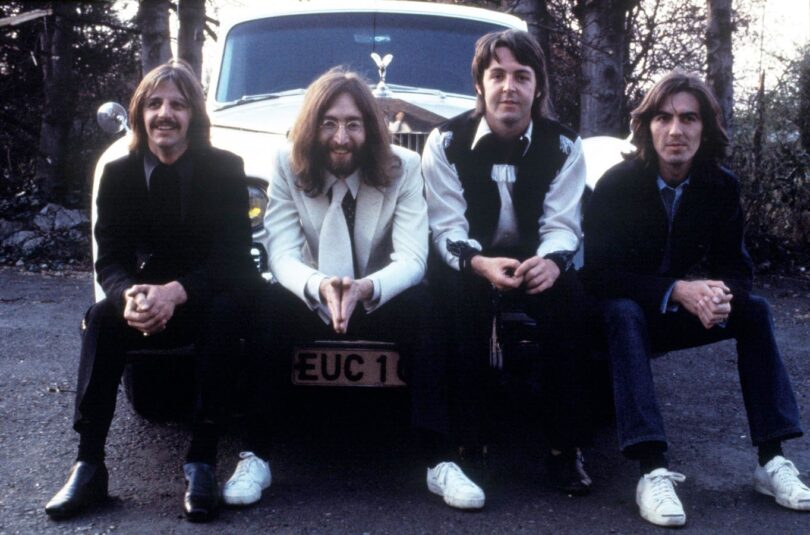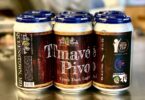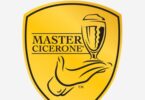The Beatles’ penultimate photo session, 9 April 1969
As Paul McCartney left the Dakota in New York City on Saturday, April 23, 1976 after a visit with John Lennon, his former bandmate patted him on the shoulder. “Think about me every now and then, old friend,” he said. These would be the final words John spoke to Paul in person.
That’s the story, anyway, pieced together from disparate statements by John Lennon and, of all people, Carl Perkins, recalling a conversation he’d had with Linda McCartney, during recording sessions for Paul’s “Tug of War” album.
If the story is to be believed, there’s an extra poignancy to the Thursday, November 2 release of what’s being described as “the last Beatles song.”
In an apparent echo of John’s last words to Paul, the song is called “Now and Then.” With verses revolving around A minor and E minor chords, it features a wistful, mournful lyric that reads—with no stretch of the imagination—as a message from one old friend to another:
“I know it’s true
It’s all because of you
And if I make it through
It’s all because of you.”
John goes on to sing:
“Now and then
I miss you.”
Is that John singing about Paul?
That Paul thinks so, at least, might explain his determination to finally complete and release the track.
Giles Martin, who produced “Now and Then” with Paul, did not speak with him about the song’s possible personal significance. But he tends to agree with the speculations of excited Beatlologists.
“I think—for what it’s worth—I think it sounds like it’s John writing to all of them,” he said in a recent interview with me. “That’s what it sounds like to me.”
He added, “It is a brilliant sort of ending song. It does sound like John’s love letter, almost. It’s classic John. It’s not like, ‘I miss you.’ It’s not like, ‘Oh my God, I miss you.’ It’s, ‘Now and then I miss you.’ You know what I mean?”
John Lennon wrote and recorded a demo of “Now and Then” in the late ’70s—though reports that John wrote “For Paul” on the cassette are the result of poor research and wishful thinking.
“Now and Then” was just one of John’s demos that the three surviving Beatles worked on in the ’90s, along with “Free as a Bird” and “Real Love.” While the latter two were completed and released as part of the Beatles Anthology project, “Now and Then” was of poorer audio quality and proved more difficult. It was shelved.
Last year, the two surviving Beatles resumed work on the track.
John’s voice was extracted from the recording with the aid of de-mixing technology developed by Peter Jackson’s team for the “Get Back” documentary project.
“There it was: John’s voice, crystal clear,” Paul said in a statement. “It’s quite emotional.”
Evidently, the television was on in the background when John recorded the demo. What was on television?
“That’s a good question,” said Martin. “I think we did have [an isolated track of it]. I should probably find out. Mind you we’d probably have to pay royalties.”
But also, what’s the extent of this technology’s capabilities? Could we similarly rejuvenate the sounds of The Beatles on stage in Hamburg? Or The Quarrymen at Woolton Fete?
“I would never say never,” said Martin.
Ringo laid down drums; Paul laid down new guitar, piano and bass tracks, and channeled George in a new slide guitar solo. George’s acoustic and electric guitar from the ’90s sessions were also layered into the mix.
Along with new backing vocal tracks from Paul and Ringo, Martin—in Cirque du Soleil mashup mode—incorporated John, Paul and George’s background vocals from classic Beatles tracks. The oooohs from “Here, There And Everywhere” and the ahhhhs and ohhhhs from “Eleanor Rigby” and “Because” imbue the new track with familiar Beatlesque drama.
“I just thought—maybe arrogantly—I just thought they would probably sing oohs at some stage on this anyway. But ‘they’re’ not around anymore. It’s all supposition: Maybe they’d have done something like that had they been in the room.
“The sound of The Beatles’ harmonies is the three of them—Paul and George and John around a microphone—and it was important that ‘Now and Then’ sounded like a Beatles song. It was important that everything on it was Beatles.” A case in point: The ’90s version of “Now and Then,” with Jeff Lynne in the producer’s chair, had synths on it. “It was like, The Beatles wouldn’t have used synths,” said Martin.
Instead, there’s a “chuggy” sting arrangement, written by Martin, Paul and Ben Foster. “An ‘Eleanor Rigby’ ripoff, if you like.”
For some perspective: “Free as a Bird” was released some 24 years after The Beatles’ breakup. “Now and Then” is to be released 29 years since the release of “Free as a Bird.”
What was it like seeing Paul collaborate with his departed bandmates?
“It’s pretty amazing, actually,” said Martin. “I’d say the key words are sensitivity and empathy, on his part.” Martin cited the care with which Paul saw that the string arrangement didn’t compete with George’s guitar.
“He was going, ‘We really need to make sure we’re playing with George because this is what George has given to the track. Let’s make sure that we’re not going against him.’ He’s always thinking about what the others are doing, and he does it with great empathy and great generosity as well.”
For his part, Ringo fell into the old rhythms with no fuss at all. “He said, ‘This is what I do. I listen to the song twice and I play it twice. I don’t play with the click track. I’ll just listen to it and I’ll play along with it. They’re my mates and I’ll play with them.’”
Martin added, “It’s definitely a band. And the key thing is that all the elements work together.”
“[I]t’s a genuine Beatles recording,” said Paul. “In 2023 to still be working on Beatles music, and about to release a new song the public haven’t heard, I think it’s an exciting thing.”
As well as “Now and Then,” this November will also see the release of new and expanded editions of the legendary Beatles compilation albums “1962-1966” (“The Red Album”) and “1967-1970” (“The Blue Album”).
The new editions feature plenty of tracks newly mixed in stereo and/or Dolby Atmos with the help of the aforementioned de-mixing technology.
As with his recent Beatles remix projects, Martin brings clarity and visceral impact to the old tracks.
“Ringo sort of says, ‘We were just a bunch of punks in the studio.’ That was the artistic intent and they were constrained by the technology at the time. If I can release them from that constraint, so they can sound like a bunch of punks, then we’re laughing.”








